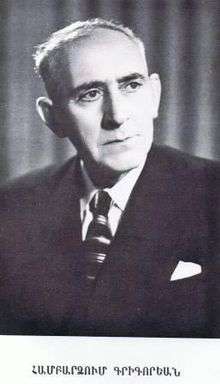Hambarsoom Grigorian

Hambarsoom Grigorian (Armenian: Գրիգորյան Համբարձում Գրիգորի, 1893 in Tabriz - July 28, 1975 in Tehran) was a composer and the founder and director of the “Komitas” choir.
Biography
Grigorian was born in 1893 in Tabriz, Iran. After graduating school in 1913, he was invited to teach at the Qazvin Armenian School.
During World War I (1914–1918), he dedicated himself to help people. After the war, he moved to Salmas and Urmia and assisted survivors of the Armenian Genocide. In 1923, he and a group of young Armenians were invited to Prague’s National University where he became interested in the Rimsky Korsakov School and continued his education there. After six months, he moved to Paris, France where from 1924–1927, he was taught under Venesandi at the Schola Cantorum. He also attended Sorbonne University where he graduated with a degree in child development and psychology.
In 1927, he moved to Rasht and taught in an Armenian school. Later, he moved to Tehran and continued his dedication to school and people. He was one of the founders of the Alik Daily Newspaper, in Tehran, which continues its daily publications till today.
He established the Komitas choir in 1928, where without interruption it actively dedicated itself to Armenian culture in Iranian cities. The choir selected “Hayrenyaz Sirov” (Love for Country) as the song that represented it.
He died on 28 July 1975 in Tehran.
Music
Hambarsoom Grigorian composed more than 200 songs. He converted Iran’s National Song, written by Amir Jahedi, to choral and presented in front of Reza Shah for his birthday ceremony. Later, he was awarded the Hamayoon Medal by the king. In 1969, Tehran cultural groups celebrated Grigorian’s 55th work anniversary and Komitas’ 40th anniversary. In 1973, Kilikiya Soorb Mesrob awarded him the Mashtos medal for his active role in the Armenian culture.